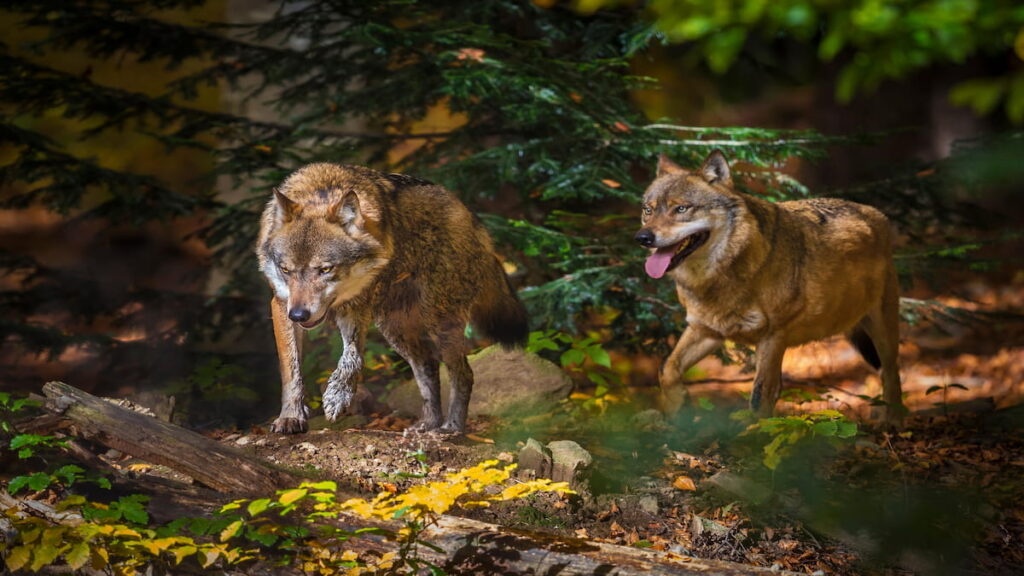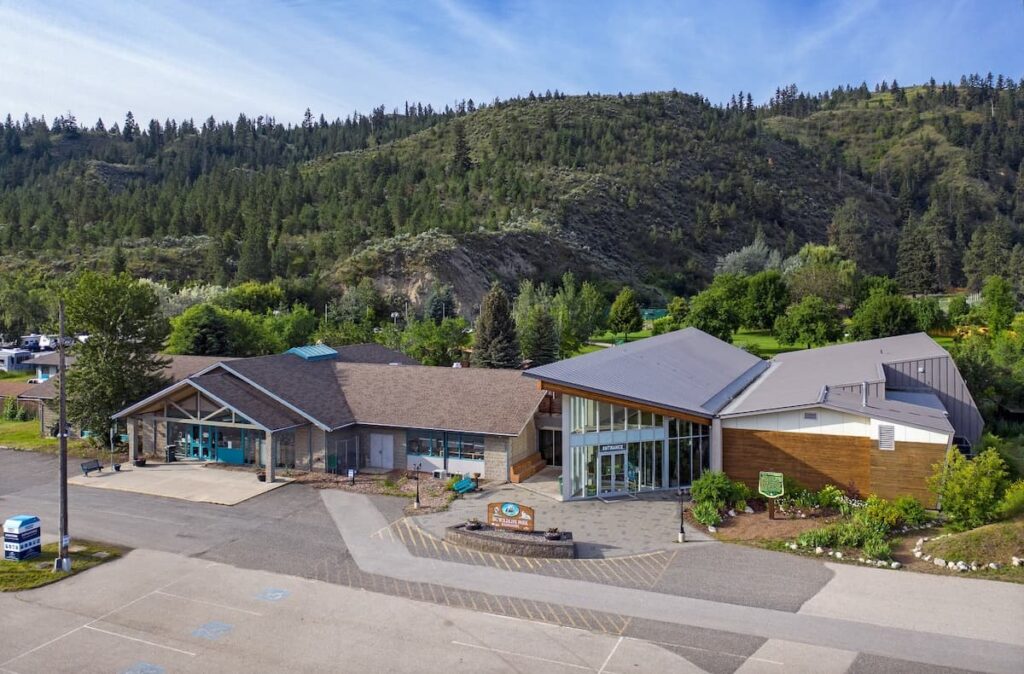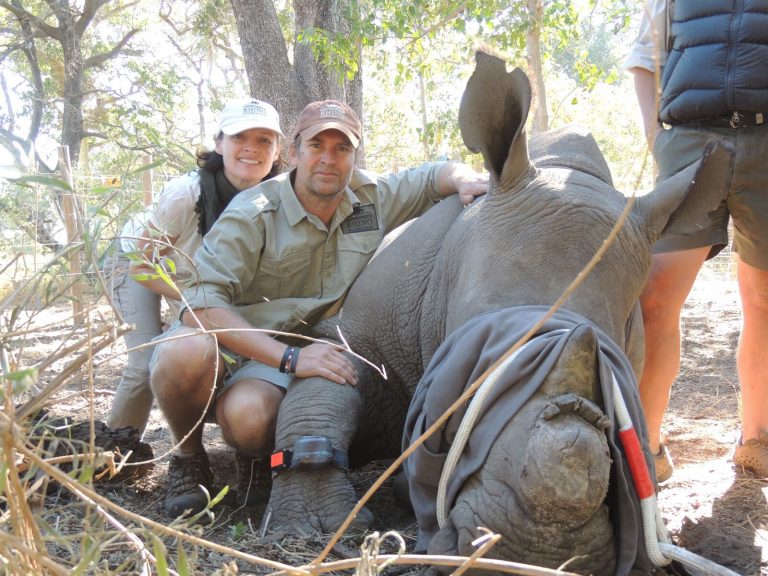
This interview was updated May 4, 2018.
Since 2007, rhino poaching has seen dramatic increases each year, reaching an all-time high in 2014 with 1,215 killed in South Africa alone. More than 6,000 rhinos have been illegally killed in South Africa in the last nine years, with rippling effects to neighbouring countries like Namibia and Zimbabwe where the losses have nearly doubled.
Brent and Chantelle Cook experienced this shocking statistic close to home when on November 16, 2010, two of their rhinos were tragically poached on their property. The loss of their own was the catalyst to form Chipembere Rhino Foundation, where today they advocate rhino conservation through education, anti-poaching technology and K9 units.
We sat down with Brent and Chantelle via Skype to discuss the reality of rhino poaching and conservation.
Can you tell us about the events that really drove the start of Chipembere Rhino Foundation?
Brent: We’d been involved in wildlife, and particularly rhino conservation, since about 2003. Back then the poaching of the rhino wasn’t something that was happening at that stage, though, it had happened a couple of decades earlier. Then it started to reappear, and in 2010 we became one of those statistics. We lost two rhino that we owned, one of them being one that was born on our property. When that happened, it was a real wake-up call and an absolute shock. So, we just felt, we’d been involved with these animals for so long and we don’t want to [sit] on the sidelines, complaining or worrying. [S]tarting the foundation created a conduit for us, from the experience we had before in conserving rhino, and the support has been incredible. The support we’ve got, a lot of it is relationships we’d forged in the years before and the foundation has been there since 2010 and it’s in memory of two rhinos that were very special to us.
Chantelle: From my side, that moment when we got that phone call, we were both together at home, it was somebody on the ground instructing us that, first of all, that an animal had been found and then there was a second animal. [T]hat moment I think will live with us forever, the feeling that it evoked. The foundation was forged out of a really tragic event, and it was something that we created initially out of emotion and out of passion. We weren’t really sure what we were going to do with the foundation or what particular avenue we were going to end in, we just knew that we couldn’t let this go by, we couldn’t sit back and not do anything. We really found our voice and our calling, so to speak, but it really was a big culling of emotion and passion.
What is the reality of Rhino poaching today? How bad is it?
Brent: It’s a difficult story to tell, but the reality is that we’re losing 3 rhino a day in South Africa. We’ve lost approximately 6,000 rhino since 2007. If you consider that there is about 18,000 white rhino and 2,000 black rhino left in South Africa, and we’re home to 75% of Africa’s remaining rhino populations, we’re now in a negative growth rate. So, for something that was always kind of our biggest conservation success story, to now seeing it slowing wilting away, it’s a big concern. It’s a huge responsibility as a South African, we’ve got 75% of the populations of white and black rhino within our boundaries and the rest of the world is looking at us to save them again. I think that’s what keeps us fighting.
The good news is, though, if we weren’t all doing what we’re doing, we’d be in a far worse state, but I can’t say that it’s getting any better, it’s still a major problem.
Chantelle: To add to what Brent has said, we occasionally do talks with school children and really try to encourage and foster a love for conservation with youth. Even just in chatting to our peers, when you talk about those numbers, three animals daily that are being slaughtered, I’ll say to my girlfriends, “When you’re going out in the morning and heading for that Starbucks coffee, now there’s another animal on the ground that’s dead. When you’re heading out to lunch somewhere, there’s another animal that’s down and dead. And at the end of a hard day, when you finally award yourself with a glass of wine, there’s a third animal that is now down.”
When you look at it like that, it’s heart-wrenching, and we can’t ignore those numbers.
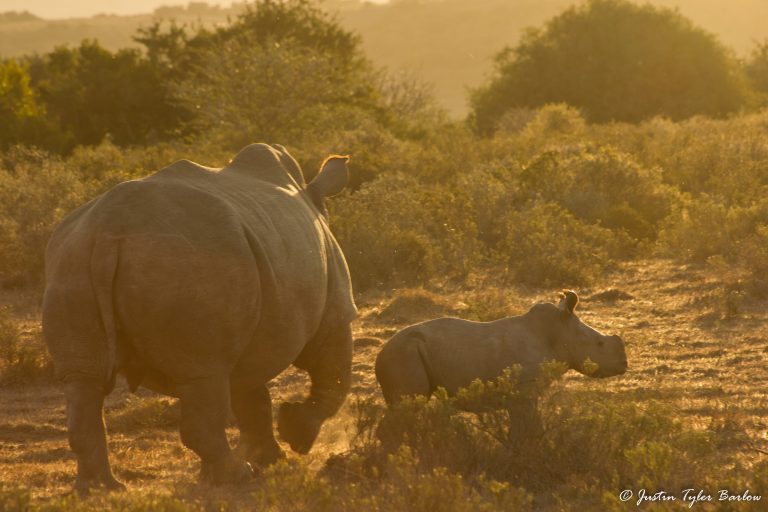
How do you think that tourism has impacted conservation as a whole?
Chantelle: I think, particularly with Africa, tourism and conservation really do go hand in hand. Eco-tourism obviously promotes and supports biodiversity, which is essential for our wildlife. The survival of our species, all species, really, relies on our ecosystems.
What’s interesting to note is that in South Africa, 90% of our wildlife is found in national parks, reserves and private reserves. These particular bodies rely entirely on tourism to support them economically. It does come down to responsible tourism as well, but I really do believe that the benefits of tourism far outweigh the negatives. We rely on tourism, not just in the country but as a continent in order to sustain these habitats. It’s the loss of habitats that effectively leads to the destruction of a species.
What kind of progress has been made with conservation efforts?
Brent: The biggest conservation progress has been the global audience. Rhino poaching is something that has hit us hard here and we’ve had to make this global call for help, and that’s really exposed the world to some of the challenges we face in Africa. Besides the other things we do on the ground to save the species, I think the biggest change is that we now have a global audience.
The threats that we’ve seen to rhino has now exposed threats to other species like elephant, lion, leopard, these are all iconic species. The world knows Africa for those species. The educating of the global audience is the positive that has come out of this and hopefully, that can permeate to youth so when they’re in the position to effect change they’ll be in a better position to make changes. The message is really, if you can’t help save the iconic species like rhino, elephant, leopard, lion, what hope is there for the lesser known species or ecosystems?
What do you think travellers can do to be more responsible when they are travelling? What sorts of things can they do to make a positive impact?
Chantelle: It starts first and foremost with the individual. My message would be “educate yourself”. It’s up to the individual to start asking the questions.
If it’s utilizing the services of a large tour operator, for example, ask questions. It’s up to you to ascertain the integrity of the tourism providers, accommodation, and suppliers of activities that they are using.
Ask about their responsible tourism ethics. Ask about what involvement there is with the uplifting of local communities. There are really good suppliers and tour operators out there, but ultimately, it starts with the traveller and educating themselves.
Sometimes just putting yourself in a position to learn and to want to learn and then taking that back to your communities can go a far ways.
I really do believe it starts with you, the individual, to do your homework and always ask about the integrity of wherever you’re going and who you’re visiting as well.
Brent: Ask questions [on the ground]. Our rangers love to answer questions, as opposed to travellers that will arrive and just take photos. You know, ask questions. Ask some of those deeper, more meaningful questions about the rhino. Go away having learned something other than the general basics, because I know, speaking from our lodge, our rangers love to share those stories, the real stories. But go away learning something a little bit more and stay in contact, if it’s something that you are passionate to help out with. If you can share that with a circle of friends and tell them about your experience and some of the challenges, it can always plant a seed with one person to make a difference in their community it can have an effect on us back in South Africa.
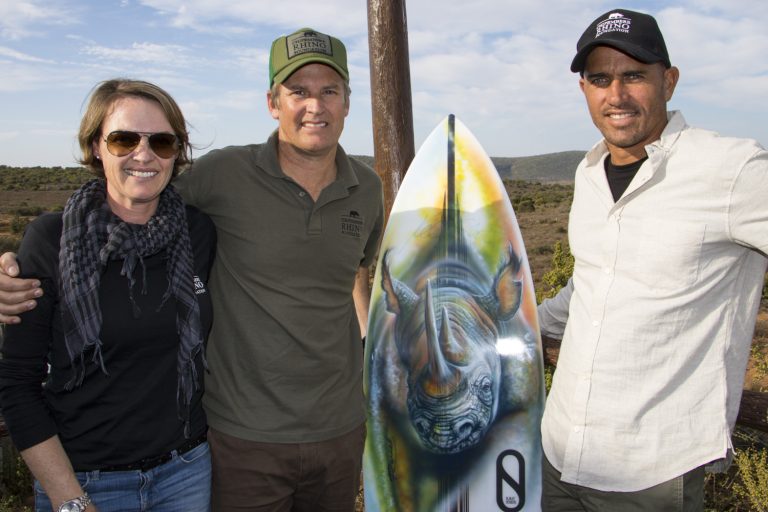
Any last thoughts or messages?
Chantelle: I would tell anyone: travel with your children. It absolutely has an impact. Some of our favourite guests are some of those that are seven years and older. It just resonates and it’s incredible to take a child out into a natural environment like that and you realize what that environment gives back to them [can’t be matched] by any form of technology. I really believe that if we can educate and impassion our children across this globe we would be in a far better standing as a global community in years to come. We’re handing this Earth over to them and we’ve got to get them behind it, passionate about it, and knowing that their voices can make a difference.
There are a number of ways that you can make a difference, but it really starts with education. Educate yourself, educate your friends, educate your communities. Look into amazing organizations like Chipembere that are constantly looking for the most effective ways to effect change.
If you’re planning on travelling to South Africa, make sure to check out HillsNek Safari Camp, owned by Brent & Chantelle along with their business partners, Paul & Debbie Naudé and Derek Cook. Set along the beautiful Bushman’s River with a stunning view of the African plains and a dinosaur fossil discovery site behind the lodge that dates back to 1845, the authenticity and magic of HillsNek can’t be beat.
For more information about Chipembere Rhino Foundation, please visit their website: http://www.chipembere.org/
To participate in an applied rhino conservation program, please check out this joint anti-poaching effort with African Conservation Experience and Rhino Revolution, here.

